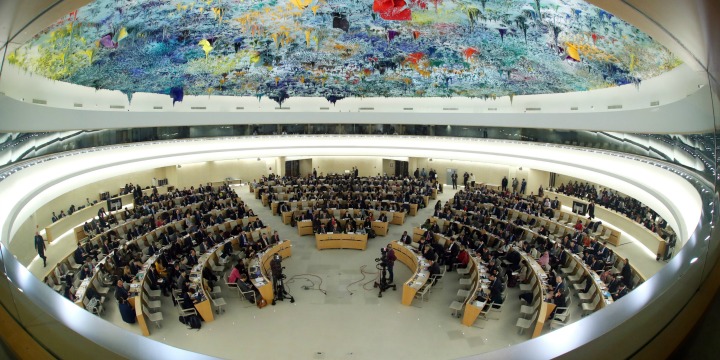 At the United Nations, Israel is ‘the Jew Among the Nations’
At the United Nations, Israel is ‘the Jew Among the Nations’
David May
 The Human Rights and Alliance of Civilizations Room of the Palace of Nations, in Geneva, Switzerland. The room is the meeting place of the United Nations Human Rights Council. Photo: Ludovic Courtès via Wikimedia Commons.
The Human Rights and Alliance of Civilizations Room of the Palace of Nations, in Geneva, Switzerland. The room is the meeting place of the United Nations Human Rights Council. Photo: Ludovic Courtès via Wikimedia Commons.
China presented itself as a champion of Muslim rights last Tuesday, when it asked the United Nations Security Council to hold a special session to address an Israeli minister’s visit to the Temple Mount, a site holy to both Jews and Muslims. (Never mind that China has detained over one million Muslim Uyghurs.) This is just the most recent case of the UN allowing human rights abusers to shape its human rights agenda.
In what one UN watchdog described as “making an arsonist into the town fire chief,” the UN elected Iran to its top women’s body in 2021. Less than half a year after Iran’s term began in March 2022, the Islamic Republic’s “morality police” accosted and reportedly murdered 22-year-old Mahsa Amini for allegedly violating female hair-covering laws. Mercifully, in a US-led vote of 29-8, with 16 abstentions, the UN’s Economic and Social Council removed Iran from the women’s commission last December. Among the “no” votes were China and Russia.
Until April 7 of last year, Russia sat on the UN Human Rights Council (UNHRC). The UN General Assembly suspended Russia from the UNHRC following its invasion of Ukraine, but China remains on the council. In this capacity, Beijing has stifled criticism of its many human rights violations, including what the United States has termed a genocide against its Uyghur minority.
According to a whistleblower, the UNHRC has secretly provided Beijing with the names of Uyghur dissident activists. And in October, the UNHRC rejected merely debating Chinese human rights abuses against Uyghurs in Xinjiang. Thirty of the council’s 47 members voted no or abstained. That tracks with the 31 council members rated “not free” or “partly free,” according to Freedom House’s annual rankings.
Chinese coercion and human rights abusers’ camaraderie led to the motion’s defeat. But deflecting criticism is not enough. To ensure the council’s attention is distracted from abuses committed by autocracies, the dictators club needs a convenient scapegoat — their target, “the Jew among the nations,” is the Jewish state.
Approximately half of the council’s country-specific condemnations have targeted Israel. Nine out of its 35 special sessions have focused on the Jewish state. The UNHRC created a blacklist to deter investment in territories controlled by Israel, something it has not done for any other disputed territory. And the UNHRC maintains a special rapporteur devoted to uncovering supposed Israeli abuses. The list goes on.
Special rapporteurs are expected to demonstrate “impartiality” and not “hold any views or opinions that could prejudice” their work. Nevertheless, like flies to manure, this special rapporteur position has attracted individuals with histories of anti-Israel activism — and even antisemitism.
In 2008, then rapporteur John Dugard justified Palestinian terrorism as the “inevitable consequence” of Israeli actions. His successor, Richard Falk, likened Israel’s treatment of the Palestinians to the Holocaust. Falk’s antisemitism was so pronounced that the United Kingdom condemned him on three separate occasions.
Current special rapporteur Francesca Albanese is embroiled in her own antisemitism controversy. Last month, Albanese’s 2014 remarks describing the United States as “subjugated by the Jewish lobby” drew widespread condemnation, including by top US officials. In a separate post from that year, Albanese claimed that the “Israeli lobby,” directed by “Israel’s greed,” skewed media coverage of the Israeli-Palestinian conflict. Though Albanese tried to distance herself from her past remarks, in July 2022, she defended another UN official who similarly claimed that the “Jewish lobby” controls the media.
Albanese has also doubled and tripled down on opposing the leading benchmark for identifying anti-Jewish prejudice, claiming it stifles free speech. In its definition of antisemitism, the International Holocaust Remembrance Alliance (IHRA), a coalition of 35 member states and eight observers, provided examples to help understand how antisemitism manifests itself. Prior to her appointment, Albanese had made comments that likely fell under two IHRA examples of antisemitism: comparing Israel to the Nazis and declaring Israel to be a racist endeavor.
Congress can help stamp out the UN’s anti-Jewish bigotry by defunding any UN agency that supports or engages in antisemitism pursuant to the IHRA definition.
Whether by removing Iran from the UN’s women’s commission, implementing human rights standards for UNHRC membership, or barring antisemites and anti-Israel activists from UN positions focused on Israel, the United States should work to prevent arsonists from serving as fire chiefs at the UN. With one fire put out for now, Washington should turn its attention to the others.
David May (@DavidSamuelMay) is a research manager and senior research analyst at the Foundation for Defense of Democracies. Follow FDD on Twitter @FDD. FDD is a Washington, DC-based nonpartisan research institute focusing on national security and foreign policy.
Zawartość publikowanych artykułów i materiałów nie reprezentuje poglądów ani opinii Reunion’68,
ani też webmastera Blogu Reunion’68, chyba ze jest to wyraźnie zaznaczone.
Twoje uwagi, linki, własne artykuły lub wiadomości prześlij na adres:
webmaster@reunion68.com
